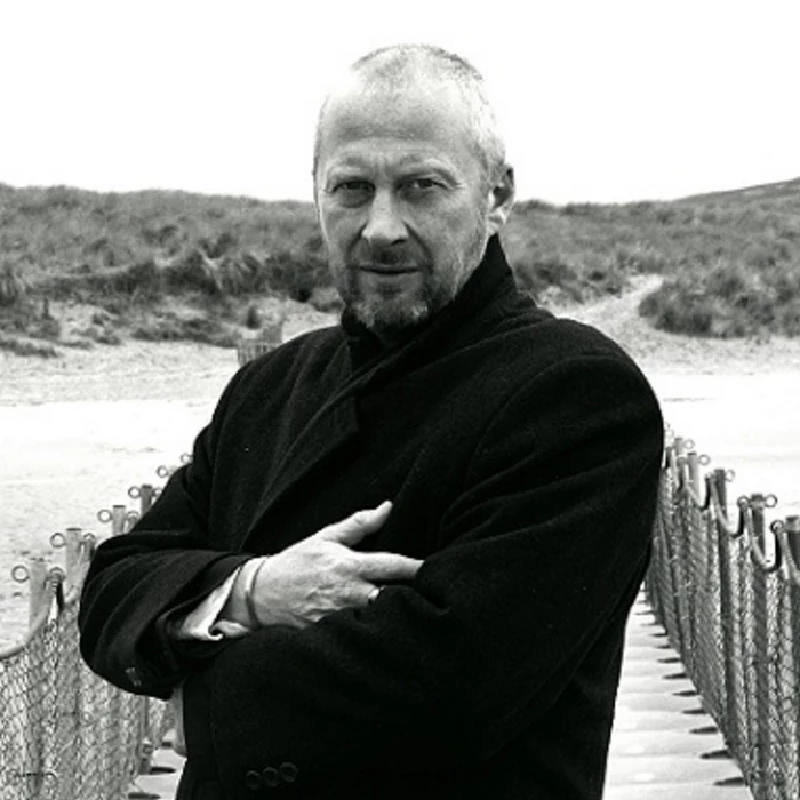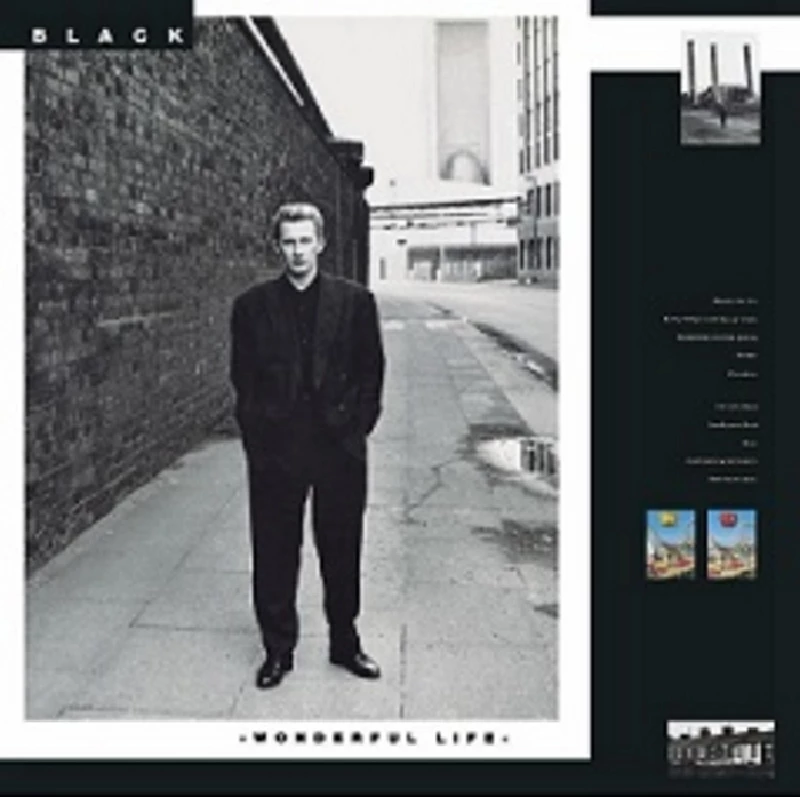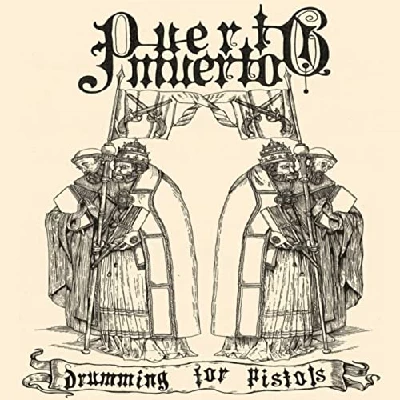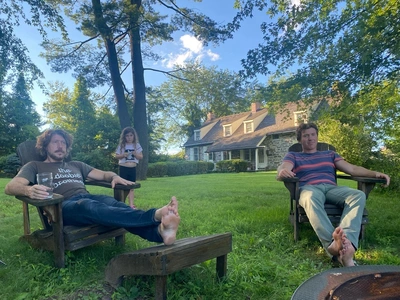Black - Interview
by Paul Waller
published: 29 / 4 / 2013

intro
Paul Waller chats to Liverpudlian singer songwriter Colin Vearncombe about his musical project Black, its bestselling 1987 album 'Wonderful Life' which has just been re-released in a double CD edition and his musical career since then
In 1987 Liverpudlian singer songwriter Colin Vearncombe found massive chart success with his Bowie-esque ballad ‘Sweetest Smile’ and the ‘Wonderful Life’ single and album under his pseudonym Black. Seemingly the downbeat heartbreaker had arrived fully formed as if from nowhere, but this was far from the truth. He had been releasing music both independently and for WEA since 1981. Ever since that chart busting duo of hits he has found himself recording and releasing music. Pennyblackmusic joined Colin after the opening night of his latest UK tour to talk about the current state of the music industry, and of course the on-going legend and legacy that surrounds ‘Wonderful Life’. We soon discovered that, whilst the chart placing’s may have dried up, his tenacious work ethic has not. PB: Your Easter tour has just begun. How is it going so far? CV: We have had an unusually auspicious start. Last October it took a lot longer to get warmed up. It took until the third gig; luckily we have hit the ground running with this one which is grand. We knew something was up because during rehearsals after around two days we had something like 25 songs worked up; it seems to be going too well. You know that feeling? On the first show despite the fact that we fucked up twice to the point of completely stopping it went great, and, of course, a fuck up is always very endearing to the audience particularly when they are that close to you. It's nice when they relate to you as a human being. PB: The venue in question, The Cellars in Eastney, seemed very, shall we say ‘intimate’. The audience must have been almost literally on top of you. CV: Yeah, as I drove past it, I was like, “Oh, fuck.” because I hate pubs to play in because typically they don’t charge to let you in, and whenever people haven’t paid to get in they have nothing at stake and they talk all the way through. Luckily it has a pub layout, but it was completely dedicated to music so if they have a gig on you can’t get in unless you have want to pay for that gig. I carried in the gear, and it smelt, and it was hot and then a whole different crowd came in during the evening. PB: Are you playing stuff from the whole remit of your career or are you concentrating on the newer stuff? CV: I’m playing lots of different things. It was with shock that I ran into someone in Portsmouth who actually saw me in 1982, and then it hit me that this is the 32nd year that I have been making records in. I think to myself I can’t be that old, but I am. My consciousness of growing old seemed to stall when I hit 28. I think everyone has an age in their head where they stop aging and I’m no different. So on this tour I nearly go back to the beginning as long as I have fun playing those songs. I don’t do ‘Everything’s Coming Up Roses’ [from 'Wonderful Life' - Ed] anymore because in all honesty I don’t think it’s a very good song. I liked the recording of it, but I don’t even remember what it was about. The crowd wouldn’t get anything out of it, and certainly not with us two guys strumming on our guitars up there. If you want to pump your fist in the air, then there has to be a drummer and this tour isn’t about that. PB: What about the new material you have recorded for ‘EP I’ and ‘EP II'? Is that included? CV: Some, yeah, I go there. PB: Is this going to be an on-going series. Can we expect ‘EP III’ any time soon? CV: It’s interesting; maybe there will be a hiatus. I am looking at the argument about the ‘album’ being dead or not. I’m looking at the fact that even amongst the people that say they love what you do only one in five will actually pay for it. It raises a lot of questions. I am not prepared to spend one year or maybe more writing tunes, sifting, filtering, demoing and spending £20,000 to record it for only 20% of people who want it to actually pay for it, so I have been treading water with these EPs. Basically CDs aren’t sexy. If you compare them to vinyl, they don’t even sound as good. We were hoodwinked; we were lied to from the very beginning by the record companies and even by ‘Tomorrow's World’. You can’t put them in soup, and if they get scratched they are even more unplayable than vinyl. PB: I remember when CDs were just out and Radio One played a George Michael track on CD, and the DJ said, “Ladies, this is as close as you’ll ever get to George Michael,” and then half way through the track it started to skip. CV: (Laughs). That’s just typical for him, isn’t it? The fractured personality that he seems to be today, but I must say I do love the idea of George Michael getting stoned and running his car into a post office or whatever it was. PB: As a kid I loved the ‘Wonderful Life’ LP, and as an adult I didn’t rediscover you until your ‘Any Colour You Like’ compilation in 2011. That’s a huge gap maybe, but it was an album and not a single or an MP3 that brought me back to the fold. CV: It’s an interesting thing the current state of the music profession, industry or business – whatever you want to call it. For years and years the record companies laboured under the illusion that they were selling pieces of plastic like they could be selling cans of beans, but plastic isn’t the product they were really selling. The music doesn’t exist except as vibrations in air. They were mixing the medium with the message. In a sense the notion of the ownership of music in that world is rather odd. For example, if you could sit at home with the world's music at your fingertips and dial up what you felt like so that the micropayment was going to the artist, I think you’d probably do it. My problem with it is that Spotify sounds like shit; it has an appalling sound quality. That’s all because we are at the very dawn of using this technology. We don’t really know what’s coming. I think maybe we will all end up having to buy a licence to listen to music if we don’t go for an artefact, and if we do want an artefact what would you choose? I made this record called ‘The Given’ in 2009 which consisted of the tracks that I had left after I recorded ‘Water On Stone’ that same year. It’s not that the tracks weren’t good enough but they didn’t fit in with the “It’s so you” feel of it. So I had these other eight tracks, and my manager said, “What are you going to do with them?” And I thought, "Well, why don’t we give them away?" There are lots of situations in life where actually, you like to say thank you, and with music there isn’t a mechanism for it. So, I thought, "Let’s not take the Radiohead model of pay what you think it’s worth." It wasn’t about that. With ‘The Given’, it was more if you want to thank me financially because you like the idea of me making music in the world then here is your opportunity, and if you don’t want to do that then you can still have the music. PB: Like the Bandcamp model? CV: I don’t know what Bandcamp is, I am only semi-literate with technology. If that’s what they do, then great. Now after six months we had a look at the figures, and we averaged out the number of people that had it and the amount of money it made, and you know what. It was almost exactly what I would have got if I was signed to a major in royalties. And of course there were no manufacturing costs, yet we gave people artwork that they could download and they could go to work themselves on it. It’s an interesting thing to think about. Maybe in the future music will be free, but you’ll pay £10 for the packaging because no one could be arsed to do it this good. That thing itself is something else. It’s like stroking a beautiful woman or whatever you might be into. You can’t replicate that, not easily anyway. PB: There is a certain romanticism concerning vinyl. The actual physical process of taking the record out of the sleeve and placing it on the turntable, then lifting the needle and placing it on the grooves. CV: Not only that but the actual scale of the thing. A company recently approached me, and they want to get busy rereleasing a lot of my stuff on vinyl. They are probably misguided but to see the artwork on a 12” square is fucking amazing. Wow, it really is lovely to see it that size. It’s great. PB: The facts don’t lie. Vinyl sales are increasing too. CV: But it’s never going to go back to the way it was, but if you care…and there is the difference. The business before now was predicated on an artificial supply and demand. The industry created a demand and you couldn’t get in there. For instance, bootlegs were hard to do etc, but in this day and age they’re not. The files just zing around between phone lines even. I keep an eye on what my kids are up to, and they are very tech savvy, and I can’t follow it. It’s so fast. And yet I hear that Jack White’s label is vinyl only and it makes money, so with that example there you are separating out the people that do care from the casual listener. I think that the casual listener got really fucked off that they would buy an album, and there was only two tracks that they liked. They just got wise. It got to the point where retailers were charging record companies to have their stuff on listening stations, and charging them for stuff at eye level in the shops, and only paying five to one for a single at sale or return, so you could see what was going to happen. Do I care that Tower went down and HMV went under? Do I fuck! Those people that care, those small indies, they’ll be back. That niche needs to be filled. The bicycle did not get rid of the horse, and the car did not get rid of the bicycle. PB: So once again you have found yourself now dealing with major labels due to your debut album, ‘Wonderful Life’, getting not only re-released but put out with a bonus disc to boot. How much say if any did you get in the track listing of that bonus material? CV: The truth is if they had disagreed with me then I wouldn’t have had any power to change it. They said they wanted to do a second disc, and I am assuming they haven’t done this for sentimental reasons, and that they did it for monetary reasons, and to make it a more attractive package. They have a tape draw full of stuff, and it doesn’t cost them anything to put a bunch of other stuff on it. The ‘Wonderful Life’ that came out and sold 2,000,000 copies is the same ‘Wonderful Life’ that came out previously on an independent label, but we added to it and did extra work to it that we couldn’t afford at the time, and I would be insulted if they just offered that so I said, "Why don’t you address the fact that I am constantly being asked about when I can release all the B side material that I recorded?" For every album I made with A&M, I recorded another album worth of stuff, and I put just as much effort and love into those songs as I did the original albums. It would have been a lot more fun recording them if I didn’t have them idiots hanging over me at the time asking me if the songs were radio friendly, and that was the problem with the 80s as far as I am concerned. People actually believed that there was a secret formula for success. If there is it’s just being fucking good. That’s of course highly subjective. Some people may love what it is, but then different people could well dislike it for exactly the same reasons. I hate jazz funk for instance, but for some people it’s the only music they can listen to. Fair play! So I did get my way this time. and they did find some stuff like a song that only appeared as an extra track in Spain, and they called it a "fairly mental mix" or something. It just makes me laugh to hear it, I don’t know why but most of the stuff disappeared.I don’t keep archives of myself. PB: With the success you had from the ‘Wonderful Life’ album, you were somewhat thrown into the spotlight. I take it that is what you wanted when you started out playing music - to be a success? CV: You have to be careful what you wish for. I did want to be successful, but fame is ghastly. It's appalling and I wouldn’t recommend it to anyone. For those people that want to get famous from reality TV shows, I can only hope it pleases them, but for me I couldn’t abide it. People get so weird around you, and then you end up being weird. No, it didn’t trouble me when it was over. I was 25 and very much under the impression that I was about to be ‘found out’, and everyone would realise that I’m not really that good, and, you know what, I wasn’t really that good back then. I considered myself a work in progress. It was just the beginning. The weird thing about this business is that you move from one massive anti-climax to the next. The best moments for me are when I crack a difficult vocal, or when a song finally opens up for me that I have been trying to write for ages. 'Top of the Pops' was a massive disappointment, and signing that deal was just the beginning of trouble. PB: You recently said that the song ‘Wonderful Life’ has created as many problems as it solved. CV: That was just for me though. It’s funny. People often say to me it must have been great to have written it, but it was such a long time ago. I say this a lot, but it feels like the song is like an eldest son that lives overseas and regularly sends cheques back. I do not have an emotional attachment to it any longer, and it’s no longer mine. The song has been taken over by the people that love it, and that is as it should be I think. My job now with it is to find new ways to breathe life in it when I take it out on tour, because I’ll be honest here a couple of times I have played it and I’ve been almost asleep, and that is not in my book of professional gestures. The trouble with writing a song like ‘Wonderful Life’ is that every song you write after it is not ‘Wonderful Life’. PB: Are the royalties that come in today from the ‘Wonderful Life’ single and album enough to allow you to develop your craft? CV: Yeah, just to give you an example, around six or seven years ago I was in Manchester on a radio station. I think it was Piccadilly, and a producer popped in to say hello, and he said to me. “You know what. We are still playing your song,” so I said to him, "As a matter of interest how much do you play it?" and he told me that it was on a computer and that he could tell me that exactly. He said that in the last year they had played it 157 times, around three times a week. Now if you think about that, that’s just one radio station, and in the summer periods they tend to play it more because it’s quite breezy. Now, imagine how much Jim Lea from Slade earns! I heard a figure, and it was something like a quarter of a million every Christmas. That’s the mother lode. I also gather that if Hoagy Carmichael had only ever written ‘Stardust’ he would have made a million two times over, and that was back in the 40s. When you do something that matters that much to people you get the rewards, and I have never felt guilty about the money that got made because I also get all the letters, some of the stuff that people write like, “This record was the one that turned me round in my darkest possible moment.” That is what this is all about. You know it’s happened to me. I’ve been to see gigs, and I’ve left the hall feeling 10 feet tall. Music is amazing for that. Every now and again, I get approached about commercial use for the song. When a company want to use the track for an advert, they need permission from the artist, and they need permission from the music copyright holder and also the publisher. Now I passed a certain point where I was legally allowed to re-record ‘Wonderful Life’, and if I did that I could cut Universal out we would get that money. It might be 30 grand per each one of the people they need to ask. I wouldn’t let it go for toilet paper use or something like that. We try to go with generic things to deal with lifestyle choices like life insurance or whatever and, if it’s in say Cameroon, well then who gives a fuck if they give you something nice? So,I did that.I re-recorded it,and they found out about it.and they blocked its usage two or three times, and they said to me “Yeah, you can do that, but you will never again be able to use any of the Universal [who now own the A&M back catalogue - Ed] songs for any future compilations. I could not believe that they could be so obstructive. The beauty of me being an indie now is that I don’t have to deal with that nonsense. What the majors are good for is to find something that is working and to make it work bigger. PB: Do you think that it will be possible for your music to ever reach that many people again? CV: Well, I’ll get there or I won’t. It’s all about the journey and the struggles. When the job’s done, you are dead. It’s the prize that drives Prince back into his studio every day of his life, and the only thing that stopped Joe Strummer was dying prematurely. A hit makes everything easy. Lots of people hear it and go, “Oh yeah, I like that,” but with my stuff now people will listen it and say, “Hmm, I may need to listen to that a couple of times before it sinks in.” In this day and age if you get one whole listen, then you are doing well. I watch my kids playing with their mates, and nothing they listen to ever reaches the end before they get on to the next track. They have very short attention spans. In fact they are often listening to music on their phones. Then I noticed in another moment they may put on Damien Rice or Mick Flannery,and then listen to it all the way through. When you’re by yourself what do you put on, or if you are at a party or at midnight with the headphones on? Me, I tend to fall into midnight with the headphones on because it’s a more intense experience for those that are interested in having ‘an experience’ anyway. PB: That’s why I love vinyl so much; you are almost forced to take the whole of the music in. It takes a small effort rather than a tap of the fingers to skip a track or turn the thing off. CV: And isn’t it great that there is an unforced natural pause? Twenty minutes is what you get approximately for one side and actually sometimes that can be enough. When that’s done and if you turn it off, it doesn’t feel as if you have made some critical comment on it, but with a CD if you turn it off after twenty minutes then it’s as if by choosing to do that you are rejecting it. When it came to putting out ‘Water on Stone’ there was a mess up. There was meant to be nine tracks. I thought to myself when I was listening back to it that it felt great, and I could listen to it easily in one sitting, and then I realised, “Oh fuck, I’ve missed a track off.” But I just thought, “Leave it off. It's perfect.” I’ll do something else with the track. It is 35 minutes long and eight tracks. PB: I hate it when a band fills up every minute of a CD with music. There is always filler when there is sixty to seventy minutes of music on the things. CV: At the beginning CDs were a lot more expensive than vinyl which is why ‘Wonderful Life’ had fifteen tracks on it and the vinyl only had ten. Today things are very different. It’s different now. Now the amount of people that are happy to pay for music are different from the people that are happy to receive it, and an argument that can be raised from that is that some people think music should be free. I am like, "Really? Give me your clothes as well while you’re at it (Laughs)! Shouldn’t they be free to me?" PB: Let's change track for a final question then? What is inspiring you musically at the moment. Who would you recommend to somebody else? CV: Hmm, the filter isn’t there any longer. There is no Andy Kershaw on the radio and there is no John Peel, so I don’t listen much these days. There is a young Irish lad called Mick Flannery who I think is immense. He has a track called ‘Ships in the Night’. He has a link to Tom Waits maybe but also to Nirvana. He has a horse, raspy voice, and he moves me to tears frequently. Also this may sound like nepotism, but Liz Lawrence who is out on tour with us. She floors me. I listen to her and I just smile. Most of the time it is just her and a guitar, yet I can hear all of the other parts somehow. There is something about her demeanour as well; she has got it, that ‘stuff’. PB: Thank you.
Band Links:-
https://www.facebook.com/blackakacolinvearncombehttp://www.colinvearncombe.com/
https://twitter.com/cvblack
Picture Gallery:-


live reviews |
|
Kazimier, Liverpool, 30/10/2012 |

|
| Darren Aston watches much acclaimed 80's act Black, the project of Colin Vearncombe, play a powerful acoustic and intimate set at a homecoming gig at the Kazimier in Liverpool |
soundcloud
reviews |
|
Blind Faith (2015) |

|
| Fine first album in six years from 80's bestselling act Black, which proves to be well worth the wait |
most viewed articles
current edition
Carl Ewens - David Bowie 1964 to 1982 On Track: Every Album, Every SongArmory Show - Interview with Richard Jobson
Colin Blunstone - Thalia Hall, Chicago, 16/7/2025
John McKay - Interview
Visor Fest - Valencia, Spain, 26/9/2025...27/9/2025
Bathers - Photoscapes 1
Billie Eilish - O2 Arena, London, 10/7/2025
Loft - Interview
Robert Forster - Interview
Sir Tim Rice - Interview
previous editions
Heavenly - P.U.N.K. Girl EPManic Street Preachers - (Gig of a Lifetime) Millennium Stadium, Cardiff, December 1999
Beautiful South - Ten Songs That Made Me Love...
Oasis - Oasis, Earl's Court, London, 1995
Prolapse - Interview
Coldplay - Wembley Arena. London, 16/8/2022
Boomtown Rats - Ten Songs That Made Me Love....
Peter Perrett - In Dreams Begin Responsibilities Interview Part One
Trudie Myerscough-Harris - Interview
Pixies - Ten Songs That Made Me Love...
most viewed reviews
current edition
Sick Man of Europe - The Sick Man of EuropeDavey Woodward - Mumbo in the Jumbo
Amy Macdonald - Is This What You've Been Waiting For?
Lucy Spraggan - Other Sides of the Moon
Phew, Erika Kobayashi,, Dieter Moebius - Radium Girls
Suzanne Vega - Flying With Angels
Bush - I Beat Loneliness
Blueboy - 2
Alice Cooper - The Revenge of Alice Cooper
Cynthia Erivo - I Forgive You
related articles |
|
: Interview (2025 |

|
| Los Angeles-based brothers and muiti-instrumenralists, Andy and Rob Campanella, about their project Simian Life and its psychedelia, folk and pop-influenced debut album, ‘Hermetic Tonal Briefing’. |
| ELF: Profile (2017) |
| Willard Grant Conspiracy/Big Hogg: Feature (2015) |
| Ozzy Osbourne: Feature (2014) |
| Christian Bland: Live Review (2014) |
Pennyblackmusic Regular Contributors
Adrian Janes
Amanda J. Window
Andrew Twambley
Anthony Dhanendran
Benjamin Howarth
Cila Warncke
Daniel Cressey
Darren Aston
Dastardly
Dave Goodwin
Denzil Watson
Dominic B. Simpson
Eoghan Lyng
Fiona Hutchings
Harry Sherriff
Helen Tipping
Jamie Rowland
John Clarkson
Julie Cruickshank
Kimberly Bright
Lisa Torem
Maarten Schiethart